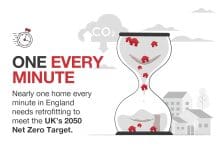The Global Cement and Concrete Association (GCCA) and its regional affiliate Federación Interamericana del Cemento (FICEM) announce the next steps to accelerate the decarbonisation of cement and concrete at the Latin America and the Caribbean Climate Week (LACCW 2022)
Colombia, Egypt, Thailand and India represent approximately 10% of global cement and concrete production when combined. To support local decarbonisation efforts, a partnership between GCCA’s Net Zero Accelerator initiative and FICEM will help reduce the industry’s carbon footprint in the region.
The GCCA has member companies around the world, including world-leading companies from the Latin America region such as CEMEX, Cementos Argos, Cementos Progreso, GCC, Votorantim, and Pacasmayo and UNACEM, along with FICEM’s members which include Domicem and Melon.
Latin America is predicted to use the most concrete and cement in the coming decades
Thomas Guillot, GCCA chief executive, said: “The urgency of addressing climate change becomes clearer every day.
“Last year our industry made a breakthrough Net Zero global commitment to reduce our carbon footprint, and we are now driving action in Latin America to make real change in one of the regions predicted to use the most concrete and cement in the coming decades.
“Our Roadmap Accelerator programme, previewed today by our members and affiliate at Latin America and the Caribbean Climate Week, highlights the tailored policies and tools we will use to ensure that Net Zero concrete and cement is achieved by 2050.”
Concrete and cement manufacture accounts for around 7% of CO2
Maria Jose Garcia, executive director, FICEM, said “Concrete and cement are fundamental to overcoming sustainable development challenges, from population growth and urbanisation to resilient infrastructure and climate adaptation.
“However, globally, concrete and cement manufacture accounts for around 7% of CO2 emissions. The global plan to eliminate these emissions by 2050 requires industry in all parts of the world to accelerate the reductions in carbon emissions.
“We are focused on innovation to support the Net Zero goal in our region. The Accelerator initiative will help our efforts to identify the barriers to decarbonisation and recommend key actions, including encouraging government policies that can have an immediate impact.”














